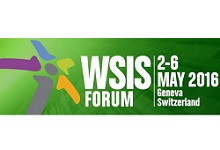ICT4SDG : Digital economy for development
2 May 2016 16:30h
Event report
[Read more session reports and live updates from the WSIS Forum 2016.]
This session moderated by Reine Essobmadje (Founder of e-volving Consulting France and Cameroon) aimed to set the floor for interaction and sharing of best practices on building a successful era of digital for economic development and inclusion.
Dr Salma Abbasi (Chairperson and CEO, The e Worldwide Group, UAE and Nigeria) was the first panellist to intervene. Abbasi first pointed to the gender divide and gap in digital literacy. She then moved to presenting the Digital Economy Framework comprising promotion and innovation, society and knowledge, service infrastructure, hard infrastructure, and soft infrastructure. In the public sector, Abbasi talked about ID cards, e-payments and entitlements, e-administration, telecoms, ICTs broadband, taxes and fees, e-education, and e-health.
She highlighted the potential opportunities for engagement mainly through advertising and marketing, education, and entertainment. Abbasi also gave examples of ICT-based livelihoods in Kenya and Tanzania from the digital economy such as mobile money agents, and electricity recharging services.
Ms Betty Bonnardel-Azzarelli (AB5 Consulting UK) exposed in numbers the phenomenon of the digital divide between developed and developing countries. She then talked about the digital economy as a means of empowering communities, providing a complete e-village to develop a certain level of autonomy and achieve the concept which she called an ‘e-ecosystem’.
In her opinion, empowering communities lies in connecting them through literacy, bridging the digital divide, and investing in infrastructure.
Mr Guillaume Pahud (Founder of DotStories) tried to briefly answer the question:Are new domain names a tool for digital inclusion? He started by stating facts about generic names such as .com which is saturated, and highlighted the fact that the increase in numbers, competitiveness, and languages does not necessarily mean inclusion because creating a domain name is not free.
Ms Yvette Ramos (Managing Director at Moinas & Savoye, an IP law firm) discussed innovation and intellectual property rights by distinguishing between social and cultural innovation, industrial innovation, scientific innovation, and technological innovation.
Ramos also talked about the hidden face-value of intangible assets in areas like finance, sales, human resources, marketing, purchasing, and information systems.
She then showed the importance of IP and intangible assets in terms of the value of invested capital in companies such as Microsoft (92%) and IBM (73%). Ramos concluded by preparing IPR strategies to protect ICTs solutions.
Essobmadje stressed the potential of the digital economy in creating success stories and new ways of interaction between citizens and their governments. She pointed to challenges such as the language barrier, as most content is in English; digital literacy; digital access; and the digital divide between countries. She also called for a Global Digital Inclusion Index (based on the following parameters: digital literacy, state of the digital economy, use of digital services, digital access, and digital inclusion), which has proved very successful in Australia.
by Ines Hfaiedh
Related topics
Related event

